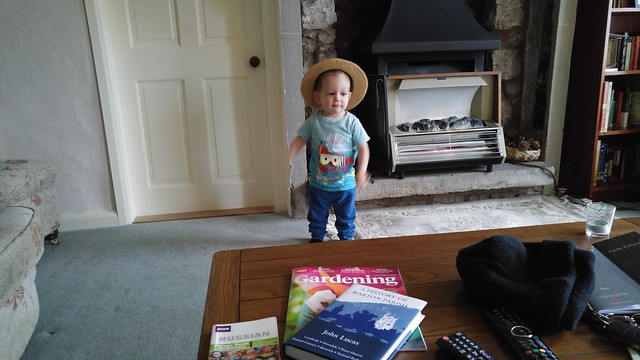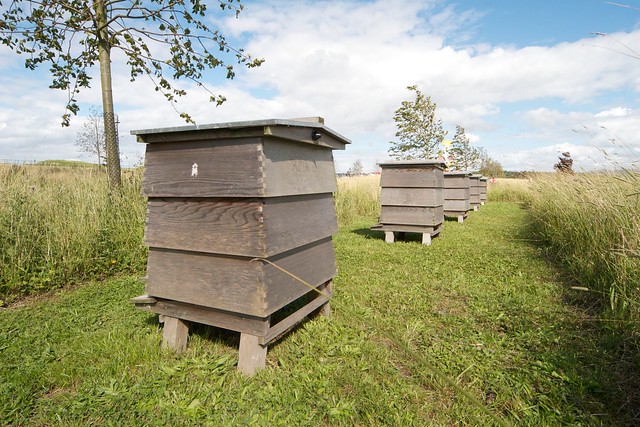Today we’re looking at the words for iron and related things in Celtic languages.
| Proto-Celtic | *īsarnom = iron |
|---|---|
| Old Irish (Goídelc) | íarn [iːa̯rn] = iron |
| Irish (Gaeilge) | iarann [ˈiəɾˠən̪ˠ] = iron (element, appliance, golf club); iron part of a tool; brass (money) amhiarann, iarnmhian = iron ore iarann rocach = corrugated iron iaranach = irons, iron implements, fetters, ploughshare iaranaigh = to put in irons, fit, cover with iron iaranaí = (made of) iron, iron-hard iaranáil = to iron (clothes) iarnmhangaire = ironmonger iarannaois = the Iron Age iarna = hardware iarnród = railway iarnúil = iron-like, ferrous |
| Scottish Gaelic (Gàidhlig) | iarann [iər̪ˠən̪ˠ] = iron, (metal) blade; day’s worth cutting peat (for two) iarnaidh = ferrous, iron-hard, iron-coloured, stingy iarnaigeadh, iarnachadh = (act of) ironing iarnair = ironmonger iarainn-tàthainn, iarann-sobhdraidh = soldering iron iarann-dreasaigidh = clothes iron iarann mòlltaichte = cast iron iarann preasach = corrugated iron rathad-iarainn = railway |
| Manx (Gaelg) | yiarn = iron; tool, scythe, blade; dough (money); tip (gratuity) yiarnagh = ferric yiarnal = iron, ironing yiarneyder = ironmonger yiarnrey = hardware yiarnaghey, yiarney = to cover with iron, to iron yiarnoil = ferrous |
| Proto-Brythonic | *hijarn = hard, hard metal, iron |
| Middle Welsh (Kymraec) | heirn, hyarn, heyrn, hayarnn, haearn = iron |
| Welsh (Cymraeg) | haearn = iron, iron bar, hardness, strength, resoluteness, hard, strong, unyielding; sword, spear, lance; iron armour, coat of mail; fetters, shackles; branding-iron, pincers; flat-iron; spur haearnaidd = like iron, ferrous; strong, hard, callous, oppressive haearneiddio = to harden, make (one) unfeeling or callous haearnol = of iron, iron-like, hard, unfeeling, rigid, stern haearnwr = ironmonger, ironworker haearn bwrw = cast iron haearn gwaith = wrought iron haearn gwrymiog = corrugated iron |
| Middle Cornish | heorn, horn, hôrn = iron |
| Cornish (Kernewek) | horn = iron hornek = ferric, iron hornell = iron (for clothes) hornella = to iron horner = ironmonger horn margh = horseshoe hyns horn = railway |
| Old Breton | hoiarn = iron |
| Middle Breton | houarnn = iron |
| Breton (Brezhoneg) | houarn [ˈhuː.arn] = iron; flat iron; horseshoe houarnek = ferric houarnus = ferrous houarnaj = scrap iron houarnajer = scrap merchant houarnañ = to shoe (a horse) houarn-marc’h = horseshoe houarn da zistennañ = iron (for clothes) hent-houarn = railway |
Words marked with a * are reconstructions.
Etymology: probably from the Proto-Indo-European *h₁ēsh₂r̥no- (bloody, red), from *h₁ésh₂r̥ (blood) [source].
Words for iron in Germanic languages come from the same Proto-Celtic root, via the Proto-Germanic *īsarną (iron), including iron in English, ijzer in Dutch, Eisen in German, and järn in Swedish [source].
Words for blood in Romance languages come from the same PIE root, via the Latin sanguīs (blood, descent, progeny, family), including sang in Catalan and French, sangue in Italian and Portuguese, and sangre in Spanish, and also the English word sanguine (blood red; warm, optimistic, confident) [source].
Sources: Wiktionary, Am Faclair Beag, Online Manx Dictionary, Teanglann.ie, eDIL – Electronic Dictionary of the Irish Language, In Dúil Bélrai English – Old Irish glossary, Geiriadur Prifysgol Cymru, Gerlyver Kernewek, Gerlyvyr Cernewec, Dictionaire Favereau, TermOfis, Le dictionnaire diachronique du breton, Geriafurch, English – ProtoCeltic WordList (PDF), Etymological Dictionary Of Proto Celtic













